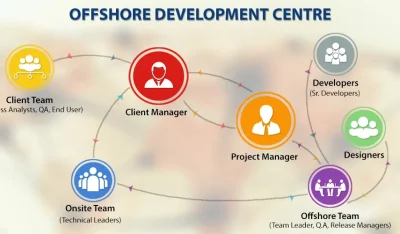- Home
- >
- Offshore News
- >
- Lessons From Top 7 IT Outsourcing Company Examples
1. IT Outsourcing Market Overview
The global IT services outsourcing market was valued at USD 639.59 billion in 2022 and is projected to grow at a CAGR of 8.0% from 2023 to 2030. This market expansion is fueled by companies looking to concentrate on core activities while reducing operational costs, with significant demand coming from the aerospace, defense, and BFSI sectors. Enhanced vigilance on data security and customer-centricity also contribute to this trend.

US IT SERVICES OUTSOURCING MARKET. Source: Grandviewresearch
The industry’s growth is further supported by the increasing need for consultancy services, including IT strategy formulation, enterprise architecture advisory, and digital transformation. Cloud computing innovations enable businesses to automate processes and improve efficiency, making SaaS and IaaS models particularly popular among SMBs.
Service providers are adopting diverse operational and pricing models to stay competitive. Multi-sourcing, where projects are divided among several vendors, reduces operational risk. For instance, E.ON SE outsourced its network system to T-Systems and its data center operations to Hewlett Packard Enterprise, while companies like NTT Data and Capgemini have successfully implemented multi-sourcing strategies.
However, the rise of Global In-house Centers (GICs) poses a challenge to this market’s growth, as seen with the establishment of 11 new Global Capability Centers in India in Q4 2022
2. Top 7 Successful Outsourcing Company Examples
Outsourcing is a smart way for companies to save time and money while boosting their competitive edge. By working with outside teams, businesses can streamline their operations, innovate quickly, and focus on what they do best. Here are seven examples of companies that have successfully used outsourcing to grow and improve their efficiency.
2.1 Slack

SLACK outsourcing company examples
Slack is a prime example of how outsourcing can drive a company’s success. Initially, Slack engaged MetaLab, a Canadian design firm, to develop its beta version in 2013. This collaboration was crucial in creating the user-friendly interface that contributed to Slack’s rapid adoption and popularity.
Within two weeks of its launch, Slack had 15,000 users. By May 2018, it had over 8 million daily active users, including major corporations like IBM, BBC, and Oracle. As of 2023, Slack has grown to over 12 million daily active users. This impressive growth and user adoption highlight the effectiveness of its early outsourcing strategy. Additionally, recognizing Slack’s value, Salesforce acquired the company for $27.7 billion in December 2020.
2.2 WhatsApp

WhatsApp outsourcing company examples
Another successful outsourcing company example is WhatsApp. In 2009, WhatsApp co-founders Jan Koum and Brian Acton hired developers in Russia to build the app. This strategy helped WhatsApp scale quickly. By 2014, just five years after its launch, WhatsApp had amassed over 450 million monthly active users and 315 million daily active users, highlighting its effective outsourcing approach.
In February 2014, Facebook acquired WhatsApp for $19 billion, making it one of the largest tech acquisitions in history. This acquisition highlighted the value created through WhatsApp’s strategic outsourcing efforts, making it a standout among outsourcing company examples.
2.3 Skype

outsourcing company examples
Skype was a pioneer and market leader in the field of internet video. With software clients that function on cellphones and PCs, practically everyone has used or is familiar with Skype. Skype, like WhatsApp, recognized that product development was not the most critical factor in its success. Instead, Skype needed to locate the necessary expertise and abilities at a reasonable cost to continue developing the program while keeping prices down.
Skype chose Estonia (East Europe) as a source of talent and hired numerous developers to work on the product. As time passed and these developers exhibited success, Skype added them as partners, further solidifying the partnership. Skype’s plan worked, as Microsoft purchased the company for $8.5 billion in 2011. Reasons for outsourcing include cost reduction, capacity concerns, and access to a pool of talents and abilities.
Skype offers a similar experience to WhatsApp, focusing on outsourcing talents worldwide. Both firms have demonstrated that the most crucial criterion, rather than geography, is the availability of skills.
2.4 Google

Examples for business outsourcing
Google began as a simple search engine but has grown into a global giant providing hardware, software, and advertising services. Today, Google is almost synonymous with the internet, and its name has become a verb used by everyone when discussing online searches.
Despite its vast scale and numerous strengths, Google recognizes that it cannot accomplish everything in-house. The company outsources various tasks to gain access to a broader pool of talents, address capacity challenges, enhance quality, and lower costs. For many years, Google has been one of the largest outsourcing business examples, delegating non-core tasks such as administration and IT labor.
Google has also outsourced development work, email support for products like AdWords, and other tasks. These outsourced workers are seamlessly integrated into their in-house support staff, providing clients with faster response times at a lower cost. Given Google’s vast size, it is challenging to quantify the extent of IT positions outsourced, especially as the company expanded into software development, IT infrastructure management, and other areas.
Google’s approach to outsourcing demonstrates that size doesn’t matter when it comes to leveraging external expertise. By identifying which tasks could be outsourced and which needed to be handled in-house, Google maximized its budget and operational efficiency. This strategic use of outsourcing highlights the significant benefits that companies can achieve, making Google an ideal example of successful outsourcing.
2.5 Alibaba

Alibaba outsourcing company examples
When discussing online eCommerce outsourcing services examples, several names come to mind, including Amazon and eBay. However, one company that has quickly risen to prominence is Alibaba. Unlike Amazon and eBay, Alibaba is based in China, presenting different outsourcing challenges and opportunities.
Most organizations outsource for financial reasons, often to lower-cost countries like India, China, and other parts of the Far East. However, when a firm is located in one of these regions, the outsourcing paradigm shifts. Alibaba recognized that while local manufacturing and resource costs were low, the talent needed for growth was not readily available at the required scale.
With this in mind, Alibaba sought partners and outsourcers early in its development. They discovered many of the necessary capabilities in the United States. By outsourcing web development to the U.S., Alibaba’s website flourished and experienced remarkable growth.
The reasons for Alibaba’s outsourcing included gaining access to a larger pool of talent, boosting quality, and allowing the company to focus more on its core business. The key takeaway from Alibaba’s outsourcing strategy is the importance of being aware of your needs. By recognizing the local talent gap, Alibaba could quickly find external resources capable of completing the essential tasks. This strategic move enabled Alibaba to grow rapidly and become a dominant player in the global eCommerce market.
2.6 Basecamp

Basecamp – outsourcing company examples
Basecamp is well-known among project managers and anyone looking for a solution to keep projects on track. Despite its prominence in the project management area, Basecamp has maintained a modest in-house team since its inception. The company recognized that trying to handle everything internally was not the best strategy. While their product was widely used to manage projects, Basecamp faced internal workflow and client support issues.
To address these challenges, Basecamp chose to outsource critical operations. This decision allowed their employees to focus on core tasks and improve efficiency. By outsourcing app development to remote developers, Basecamp facilitated continuous enhancements to their product, supporting growth. Meanwhile, the internal team concentrated on refining internal processes and organization, ensuring the company thrived.
The primary reason for outsourcing was to achieve a greater focus on core business activities. This strategic move enabled Basecamp to enhance overall efficiency and concentrate on essential business tasks. The key lesson from Basecamp’s experience is the importance of identifying and addressing internal business operation issues. By outsourcing specific tasks, Basecamp effectively managed their organization, leveraging external resources to improve product development and internal operations, leading to sustained growth and success.
2.7 Citigroup
Citigroup has been a pioneer in outsourcing its IT operations since 1992. The corporation operates various offshore facilities in India, the Philippines, and Poland, which handle a significant portion of its IT functions.
In 2012, Citigroup reportedly cut 11,000 workers at its headquarters, with at least a quarter of these cuts affecting IT-related positions. The majority of their IT operations are now performed abroad. This strategic move has allowed Citigroup to leverage cost efficiencies and access a broader pool of talent.
Along with its “facilities of excellence” (offshore development centers managed by Citigroup), the corporation has ongoing agreements with several outsourcing firms, including TATA Consultancy Services and Wipro. These partnerships have enabled Citigroup to maintain high standards of service and innovation while managing costs effectively.
Citigroup is not alone in this approach. Other financial giants like Bank of America, Barclays, Goldman Sachs, and J.P. Morgan also outsource tech skills to optimize their operations and stay competitive in the financial sector.
3. Key Takeaways on Outsourcing Company Examples
The successful outsourcing examples we’ve provided are just the tip of the iceberg in answering the question: Which is the best example of outsourcing? If you’re in the growth phase and unsure about the next step to drive expansion, consider exploring outsourcing.
Outsourcing can help you find qualified candidates, stick to your budget, and free up time for your talented team members who spend too much time on monotonous tasks. This strategic move can be the solution you need to expand your organization and compete on a global scale effectively.
In the long term, outsourcing is an art. The most impressive outcomes often come from inspiration combined with a well-thought-out strategy. Once you know what you want to outsource and why, you can decide who to hire. The good news is that trained specialists are available to help you find the right individuals to drive your vision to success.
4. Create Successful Outsourcing Company Examples With InApps Technology

InApps – Example of an outsourcing company
InApps Technology is more than just a software development company offering app and web development services; it embodies the aspirations of Vietnamese developers. Driven by a passion for technology, we established InApps to empower Startups and SMEs to leverage technology for accelerated business growth.
At InApps, your software development project is fully managed, enabling seamless collaboration with a specialized team of professional developers. Our process is designed for simplicity and efficiency:
- Define Your Needs: Share your project requirements and staffing needs, whether you need a single developer or a full team.
- Select and Manage: Using your preferred tools and processes, you can interview, hire, and manage your software engineers.
- Collaborate and Deliver: Your team will operate under your direction, supported by our retention program to minimize turnover and maintain team satisfaction.
Create your own outsourcing company examples by contacting us now.
Let’s create the next big thing together!
Coming together is a beginning. Keeping together is progress. Working together is success.



















